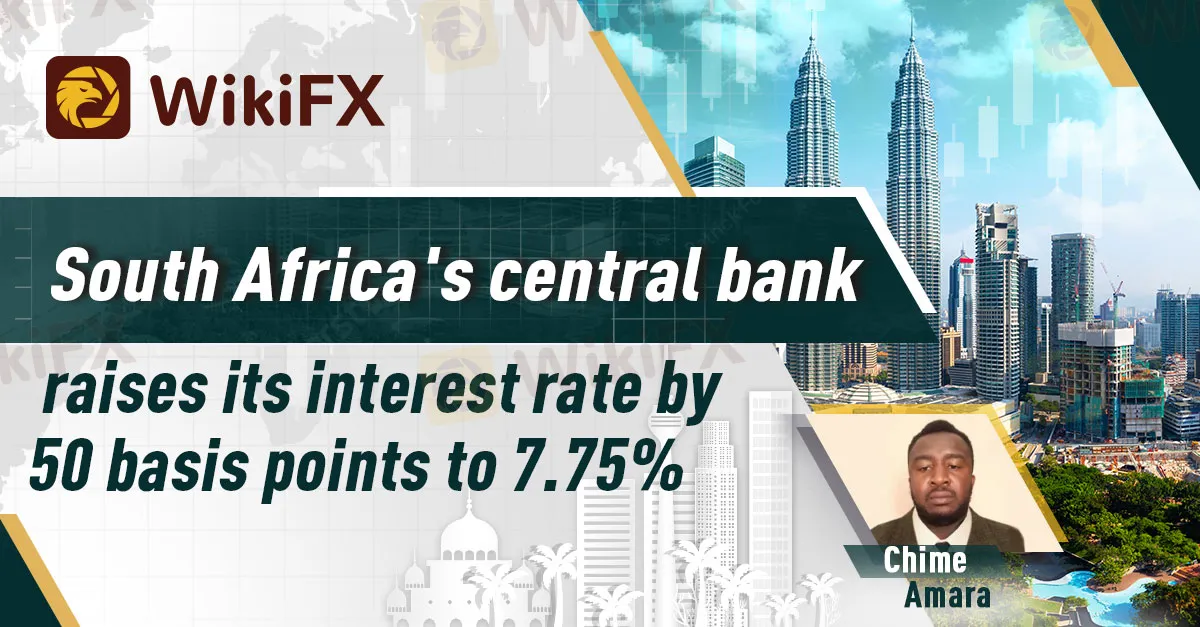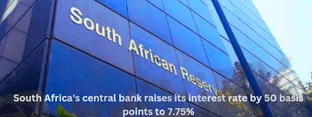简体中文
繁體中文
English
Pусский
日本語
ภาษาไทย
Tiếng Việt
Bahasa Indonesia
Español
हिन्दी
Filippiiniläinen
Français
Deutsch
Português
Türkçe
한국어
العربية
South Africa's central bank raises its interest rate by 50 basis points to 7.75%
Abstract:South Africa's central bank has raised its main lending rate by 50 basis points to 7.75% last week's Thursday in an effort to curb it's rising inflation rate.

By: Chime Amara

South Africa's central bank has raised its main lending rate by a surprising 50 basis points to 7.75% in an effort to curb it's rising inflation rate. The current hike came much higher than the market expectations of just 25 basis points.
This marks the ninth consecutive time the South African Reserve Bank has raised rates, adding a total of 425 bps to the repo rate since tightening policy in November 2021.
The move comes after February consumer inflation in South Africa rose to 7.0% year on year from 6.9% in January, indicating that nationwide power cuts may be driving price pressures. The central bank aims to keep inflation between 3% and 6%.
The Monetary Policy Committee was divided in its decision, with three members advocating for a 50 bps increase and two favoring a 25 bps increase. Central bank governor Lesetja Kganyago cited risks to the inflation outlook, stating that despite easing of producer price and food inflation, global price levels remain elevated, while electricity prices and other administered prices present short- and medium-term risks.
Kganyago also noted that the headline inflation rate in South Africa has been primarily driven by fuel, electricity, and food price inflation. He further revealed that he expects food and fuel inflation to ease gradually, up to 4.9% by 2024 and 4.5% in 2025.
Market analysts expressed surprise at the central bank's decision, with some noting that the higher outlook towards food and core goods inflation prompted the move. FNB Chief Economist, Mamello Matikinca-Ngwenya, said the road ahead is precarious, indicating uncertainty in the economic growth prospects. The rate hike has also triggered a surge in the rand, which rose nearly 2% against the dollar.
Overall, the central bank's decision to raise interest rates by 50 basis points is a sign of its determination to address rising inflation, even if it comes as a surprise to many market analysts. The impact of the rate hike on the South African economy remains to be seen, but the central bank's cautious approach suggests that it is closely monitoring the situation and taking steps to address any risks to economic stability.

Disclaimer:
The views in this article only represent the author's personal views, and do not constitute investment advice on this platform. This platform does not guarantee the accuracy, completeness and timeliness of the information in the article, and will not be liable for any loss caused by the use of or reliance on the information in the article.
Read more

Alleged Concerns with TradeEU.global's Trading Practices
An individual trader has come forward with allegations of an unfavourable experience while using the services of the broker TradeEU.global.

Lured by False Promises: Malaysian Driver Lost RM218K to an Investment Scam
A 49-year-old e-hailing driver in Malaysia fell victim to a fraudulent investment scheme, losing RM218,000 in a matter of weeks. The scheme, which falsely promised returns of 3 to 5 per cent within just three days, left the individual financially devastated.

SFC Freezes $91M in Client Accounts Amid Fraud Probe
SFC freezes $91M in client accounts at IBHK, SBI, Monmonkey, and Soochow over suspected hacking and market manipulation during unauthorized online trades.

Italian Regulator Warns Against 5 Websites
The Italian regulator, CONSOB has issued a warning against five websites offering unauthorized financial services. This regulatory action aims to protect the public from fraudulent activities.
WikiFX Broker
Latest News
What Makes Cross-Border Payments Easier Than Ever?
Trader Exposes Unethical Practices by STP Trading
Saxo & Portuguese Bank Partnership
SEC Fines Broker-Dealers $275K for Incomplete SAR Filings
Lured by False Promises: Malaysian Driver Lost RM218K to an Investment Scam
FTX Sets March 2025 Timeline for Creditor Payouts: What It Means for Investors
What is an Economic Calendar? How it works
Italian Regulator Warns Against 5 Websites
SFC Freezes $91M in Client Accounts Amid Fraud Probe
Bybit Launches Gold & FX Treasure Hunt with Real Gold Rewards
Currency Calculator


